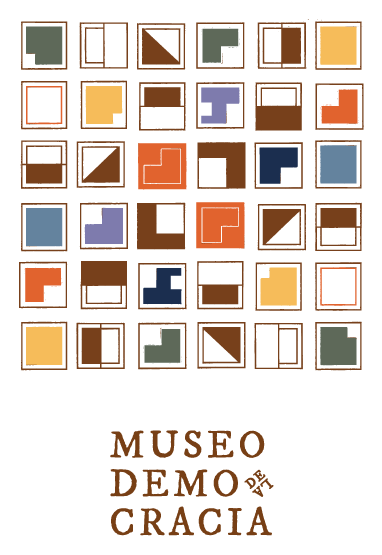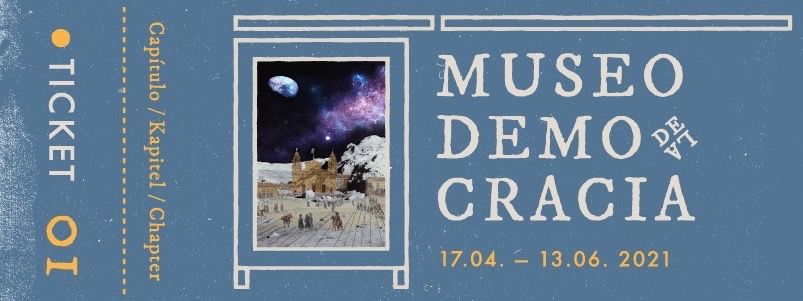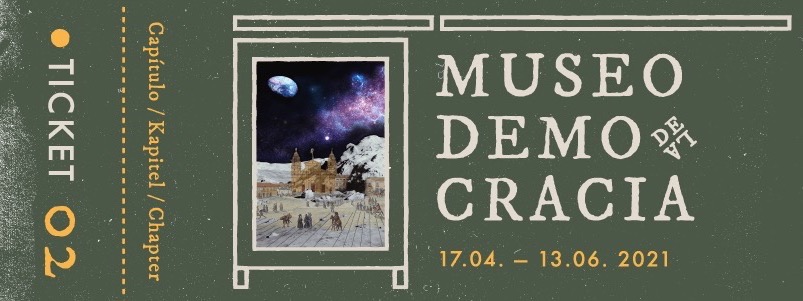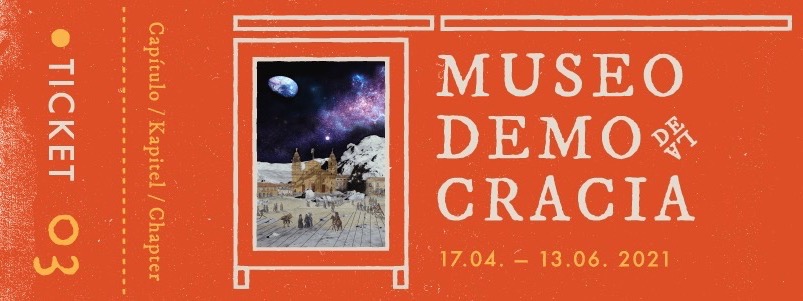

Chapter I. Plaza del Kiosco [Kiosk Square]
Opening: 17th April – 6th May 2021
The kiosk, an installation object, is a central point in the space of the museo de la democracia, and reflects the museum in its entirety. The kiosk offers objects for immediate consumption: postcards, videos, books and publications that change and overlap throughout the exhibition’s duration. Kiosks are central nodes in the urban grid. They bring us into contact with a daily economy of affects, mobilisations and sieges, and act as a point of reference in the experience of life in the city. In this case, the kiosk becomes a point of dislocation in the social and territorial order, as well as a place for reinterpreting and activating public and private life. ›Plaza del Kiosco‹ is an oxymoron that displaces everyday life, bringing it to the centre.
This is an environment for the incubation and explosion of shared life. Both inside and on the walls of the kiosk are works that address the parameters of meaning framing the founding narratives and the constitution of cultural, political and social life in the present-day Latin American republics. Works by Victor de la Rocque, Andrés Durán, Zultan Kunckel and Dulce Pinzón reformulate iconographies, monuments, myths and stories relating to the role of the hero as a vehicle of political representation.
Positions such as Gustavo Artigas, Valeria Fahrenkrog & MITKUNSTZENTRALE, Michael Wesely and Doris Salcedo experiment with the affective and historical nature of public spaces occupied by mobilized citizens. Galería CIMA in Santiago de Chile, meanwhile, uses a surveillance camera to permanently record the Plaza Italia/ Plaza Dignidad, epicentre of social uprisings since October 2019. In the exhibition space, a cut of the most relevant episodes will be displayed, alongside a live stream to the still-active protest site accessible via a QR code. Julia Weist & Nestor Siré‘s work transforms the kiosk into an information distribution point. Their devices translate and transfer the interactivity of the internet to a Cuban context, where many people are still kept offline. This practice has roots in Cuba‘s clandestine systems dating back to the 1970s.

2. Department of Opportunism and Opportunities
Opening 7th May – 27th May 2021
The discourses of this Department approach political science, colonial critique and the anti-extractivist struggle. Its ironic title is a nod to stereotypical views on the regions of the Global South, whose social rules often challenge conventions and modes of understanding in the West. The modern history of violence and machismo in many of these regions has created a culture of coup d‘états supported by decadent aristocratic classes that are still in power today. According to history and the gamut of stereotypes currently in force, these countries apparently abound in cheap natural resources, exuberant landscapes, ›narco parties‹ and beautiful girls: an El Dorado of opportunities where the possibilities for exploitation can lead to vast riches – for those who can make it.
This Chapter’s works and activities denounce censorship, institutional violence, neo-extractivism, the relationship between bodies and authority, and histories written and overwritten in blood and iron. Their contents reflect on heterogeneous modernities that encourage and ripen specific political scenarios and their aesthetics, while creating a new social ethos that defends oppression for the sake of the market.
In the constellation of positions that comment on this context, risk is an ever-present element experienced performatively in the city. It goes hand- in-hand the agonistic nature of social mobilisation, as can be seen in Brazil from 2016 and in Chile from 2019. This department writes its narrative through the works of Cheril Linett, Matheus Rocha Pitta, Jaime Lauriano, Ana Maria Millán, Marilyn Boror Bor, Andressa Cantergiani, Julia Mensch, Kiyoshi Yamamoto, PSJM and Daniela Ortiz, complemented by the activities of the public programme.

3. Office of Dreams
Opening 28th May – 13th June 2021
Here, the Department of Public Activities of the museo de la democracia is concentrated. In collaboration with artists, specialists and actors from different socio-cultural groups, a program will connect with initiatives and cultural micro-phenomena active in Latin America. The works in this chapter correspond with a self-reflexive educational program, that emphasises the community museum model, which is highly present in the region. These ›Museos Comunitarios‹ are founded on the desire to recreate, give meaning to and systematise the collective memory of local communities as a tool to strengthen their own identities, resisting historical processes of silencing and repression.
In this spirit, the museum presents works from and collaborations with artistic projects that relate to Latin American community museums. The work of Maria Thereza Alves »Son del pueblo« relates to the archaeological collection of the Museo Comunitario del Valle de Xico on the outskirts of Mexico City. Marcela Moraga collaborates with a collective of young activists to found the Museo del Agua [Museum of Water] in Renaico, southern Chile, while artist Julia Mensch cooperates with the Museo del Hambre [Museum of Hunger].
One of the main resources of the museum is the audio archive »Archivo sonoro militante – Las protestas de las calles de América Latina« produced by artist Manuela García Aldana in collaboration with the ›Oficina de Sueños‹ of the museo de la democracia. This program investigates the sound dimension of uprisings and protests, compiling anonymous donations of audio material.